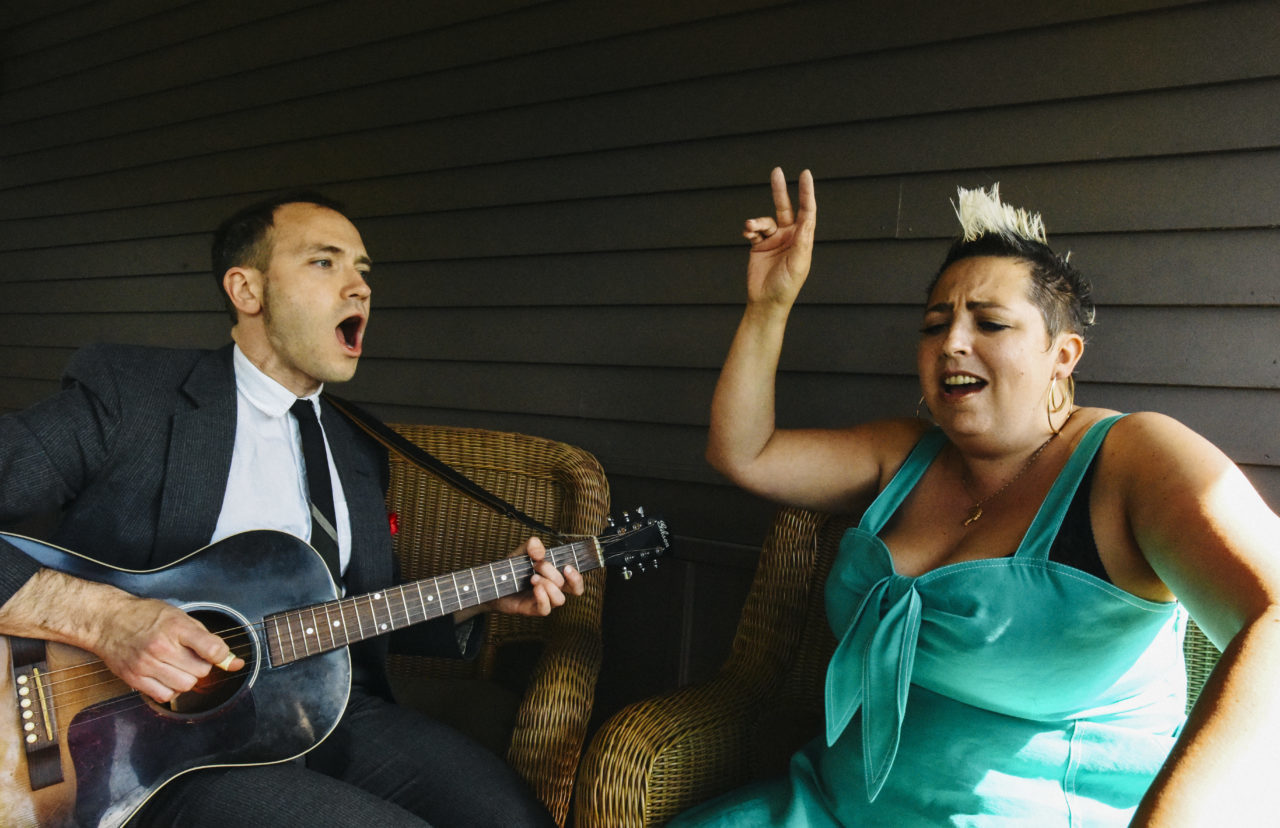This page is a memorial for Jeremiah’s former band with Jewlia Eisenberg (of blessed memory)
Old worlds collide in Book of J, as musicians Jewlia Eisenberg (Charming Hostess) and Jeremiah Lockwood (The Sway Machinery) take inspiration from the intersection of the sacred and the radical to create hit songs from out of the depths of American psalmody, Yiddish folklore, and international Jewish liturgical traditions.
The BBC calls us:
“a wonder of haunted American roots music, taking listeners from Yiddish laments to labor anthems via mystical twists and turns.”
The New Yorker says:
“The affecting, expansive musical landscape of Book of J encompasses gothic Yiddish songs, Piedmont blues, and queer politics.”
The Mercury-News says Book of J is “weird in all the best ways.”
ABOUT THE ARTISTS
Jewlia Eisenberg is a musician and composer working at the intersection of voice, text and diaspora consciousness. Her music is mostly released with John Zorn’s Tzadik label on the Radical Jewish Culture imprint. Her installation work has been curated into the Contemporary Jewish Museum in San Francisco and the Museum of Peace in Uzbekistan; she performs regularly in Europe and the Americas. She has been a visiting artist at CalArts, MIT, and the University of Colorado.
Jeremiah Lockwood has played around the world from Montreal Jazz to the Festival au Desert in Timbuktu, Mali, as the leader of The Sway Machinery and as the guitarist in the Balkan Beat Box. Jeremiah was a recipient of a Six Points Fellowship for Emerging Jewish Artists, an Artist-in-Residence for the Forward and a Brooklyn Philharmonic Orchestra Composer Fellow. He recently defended his dissertation on Chassidic cantorial revivalism at Stanford University.
ABOUT THE NEW PROJECTS
LA ARCHIVERA: Emily Sene was a Sephardic Jew from Turkey. She immigrated in the 1920s to Cuba and lived happily in Havana for years, meeting and marrying musician Isaac Sene there. In the 1940s, they moved to Los Angeles. They had a good life, but she missed the music of her youth: Sephardic pop songs in Ladino. In the 1950s, she began to drive around LA, picking up unwanted records from other Turkish Jews. Soon after, she bought a tape recorder, and began recording singers in her community, especially her husband and his crew. With no institutional support or formal training, Emily Sene became the most important collector of Sephardic song in the Americas. Her sonic archive (held by UCLA) celebrates joyous sensuality, language diversity and an aesthetic informed by her journey: Edirne—Havana—Los Angeles. In LA Archivera, we arrange and compose new music based on Sene’s collection and in conversation with her sites of migration. This presentation is a performance, an introduction to 20th-Century Jewish Ottoman music traditions, and an exploration of Sephardic Jewish music culture in mid-century Los Angeles.
BENT LIKE A QUESTION MARK: Celia Dropkin was a transgressive visionary who published her first poems in Yiddish around 100 years ago. She wrote about desire and violence in a way that feels shockingly true; her work is well-loved by musicians, weirdos, and gender theorists. Book of J (Jewlia Eisenberg and Jeremiah Lockwood) were artists-in-residence at YIVO last year, setting Dropkin’s papers to music—including unpublished poems, autobiographical sketches and letters. This presentation is a performance, an introduction to Dropkin’s work and milieu, and a discussion of open-archive process, where everything from research to brainstorming to listening to composition to rehearsal to presentation happens at a single site.
contact: jeremiahdaniellockwood@yahoo.com
Buy the album:
http://www.3rdgenerationrecordings.com/products/609681-book-of-j
